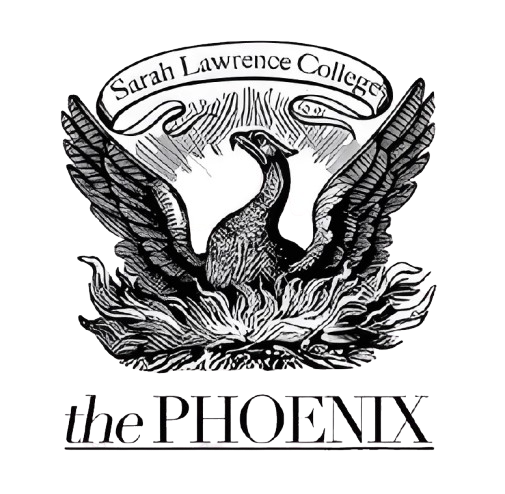Students Protest Guest Speaker Jodi Rudoren
Aurora Sharp ‘26
Photo from SLC SJP on Instagram of the Alternative Talk.
Students gathered on the Barbara Walters Campus Center steps Thursday, Mar. 28 to protest the presence of Jodi Rudoren, a guest journalist and editor who has been widely decried as a Zionist.
Rudoren is the current editor-in-chief of Forward, a Jewish news outlet, and has previously worked as a reporter for The New York Times. She was invited by the college for this year’s Adda Bozeman lecture, titled How to Report from a War Zone.
Carrying banners and signs, protesters expressed their solidarity with Palestine, their rejection of Jodi Rudoren, and their condemnation of the college’s actions and statements surrounding Israel’s war on Gaza.
Laurel Collins ‘26, the co-chair of the Sarah Lawrence Socialist Coalition, gave an impassioned speech at the protest, highlighting the colossal death toll that has taken place in Gaza. “As of yesterday, Mar. 27, Israel has murdered over 32,000 Palestinians in their genocidal campaign in Gaza over the last six months. Over 13,000 of those murdered were children,” Collins said.
Collins went on to call out Rudoren for her past statements on the conflict. “Jodi Rudoren’s call for prolonged ‘Jewish control of Jerusalem’–which necessitates the expulsion of Palestinians–is essentially insidious.”
Campus Safety’s presence was palpable as lecture attendees filed quietly past the protest and into Campus Center Room B. Each had their name meticulously checked against the registration list before being allowed to enter the lecture room and settle into the neatly arranged seats. With tensions high, James Verdicchio, the Director of Campus Safety, has been working to keep conflict from escalating, especially with members of the public attending the lecture. Verdicchio said that his main goal is to “let students and faculty express themselves” and protect their First Amendment rights.
Most of the lecture’s audience was middle-aged or older adults, many from outside the campus community, with only a handful of students mixed in. Phillip Nielsen, Sarah Lawrence history professor and current Adda Bozeman Chair, acted as interviewer. Nielsen and Rudoren began the event by discussing Rudoren’s past experiences reporting in Gaza, and the dangers reporters face while working in a war zone. Rudoren expressed that she felt largely satisfied with the current coverage of Gaza. “More voices have been heard and more good journalism has been done,” she said. However, she had a lot of criticism for activist writers. “Activists have stated clear biases and so their judgment of neutrality… and truthfulness may not be the best.”
In a time when many would argue that a middle road doesn’t exist, Rudoren did her best to make herself appear neutral and amicable, answering questions with practiced tact. She rejected the label of Zionist, as well as the concept of Zionism in general. “The only ‘ist’ I am is a journalist,” she said, dismissing the notion.
Across Andrews Lane, protesters made their way to the library for an alternative faculty talk. In stark contrast to Room B’s neat, fluorescently lit lecture, attendees of the alternative event crammed into the library’s Pillow Room, gathering around tables, sitting on the floor, and spilling out into the hallway. The room felt heavy with purpose, the students energized by the recent protest.
The event was moderated by Sarah Lawrence alumn Nikita Patel ‘09, and featured two guest speakers, Emmaia Gelman, a Sarah Lawrence professor of Public Policy, and Hussein Omar, a member of the Writers Against the War in Gaza. In her introduction, Patel addressed the college’s decision to invite Rudoren to the school. “Make no mistake,” Patel said, “Choosing Jodi as a guest lecturer is a message to those of us demanding a moral stance and disinvestment from this administration.”
“This is a fundamentally very different kind of event from the one that’s happening next door,” said Gelman when it was her turn at the podium. “That event is amplifying voices that have held sway for decades.”
Gelman and Rudoren, in many ways, had mirroring points. While Rudoren showed distrust towards activist writers and their bias, Gelman expressed concern about media controlled by Israeli and Zionist institutions. She went on to talk about the dangers of astroturfs and mega-donors, and how to navigate interacting with these sorts of organizations.
Hussein Omar spoke about the Writers Against the War on Gaza (WAWOG), a coalition modeled after American Writers Against the Vietnam War, and inspired by the ACT UP’s activism in the ‘80s. WAWOG has called out The New York Times repeatedly for its biased and passively-written reporting on Gaza, and Omar sees the mega newspaper as corrupted and irredeemable. This past fall, WAWOG occupied the The New York Times lobby to bring attention to its coverage, distributing copies of The New York War Crimes, a lookalike to The New York Times made by the coalition. Omar explained that the coalition has targeted The New York Times because it’s generally seen as an impartial publication, and therefore holds a lot of weight.
Back in Barbara Walters, Sarah Lawrence President Cristle Collins Judd gave a statement to the Phoenix on the controversial nature of the event. Much like Rudoren, she tried to walk a middle line. “As an institution we’re a place where we should be able to have dialogues,” she said.
When asked about her thoughts on the alternative faculty talk in the library, she responded carefully. “On the one hand, organizing events is a way of making a statement, and there’s a respect in that,” she said. “On the other hand, I hope we can continue to build a place where we can be a ‘both and’, not an ‘either-or’.”

